#(the same way Zeus birthed Athena)
Explore tagged Tumblr posts
Text
three identical triplets



in which... three identical triplets are living three absolutely different lives
warnings: very light smut
August 1 was an eventful day for thirteen Greek Gods and Goddesses. the birth of three identical triplets. three identical demigods. it was unknown just exactly whos children they were. it caused an uproar between the men. there was fighting between in every hallway and chamber in all of Olympus. even hades was involved. the last time he was involved in anything was the commotion caused by the discovery of Percy Jackson a few years prior. it was loudest the empire had ever been. between the women was nothing but speculation and rumors. when everything had finally died down enough, a meeting was held, led by none other than Zeus himself. his face was flush with anger. his expression was like none other. for somebody who had his own forbidden child, he sure was involved in other peoples business.
“is anybody gonna fess up? Is anybody going to claim the children?” silence. complete and utter silence everywhere. theres a cough heard in the room, a sign of everybody keeping their mouths shut. the silence was broken by Athena speaking, clearing her throat beforehand. “you idiots could always… visit the mother. surely one of you will recognize her, no?” she suggests, looking around the room. the Gods all nod and agree, preparing themselves to make their journey to the human world. though they could have gone if they wanted to, most of the Goddesses kept their place. the only outlier of the situation was Hera, Goddess of Marriage and Family. she, too, got ready for the trip. the goodbyes to the other Goddesses were quick, its not like there was much to talk about anyway. most of them disliked one another for ninety percent of the year.
upon arrival to the hospital room, a majority of the Gods took a step back. theyd never seen the mother in their lives. the three who remained eyed each other, shaking their heads in disbelief. there was no way they all fell for the same woman. she was sleeping now, so there was no way to ask. scientifically, there was no possible way for one mother to have three separate fathers. unfortunately for them, the rules werent quite the same. Hell, Aphrodite could think of getting someone pregnant and it would happen. no, this was different. each God standing in the hospital room was a father to one of the babies in the room. Hera scoffs at the sight of their mindless mumbling, slapping each of the three on the back of the head. “Idiots. look at the babies and just… pick one. you’ll know.” she nods, looking at the Gods in front of her.
the first to move is Ares. he strides over to the bassinets at the edge of the bed, eying over each small child. he reaches for the baby in the middle, the connection instantly being clear to him. he nods as he kisses the top of the babies head, looking at the name tag in the plastic looking bed. “Matthew…” he whispers, nodding once more. “yeah this ones mine.” he states, setting the infant down.
the next to move is Hermes, instantly reaching for the bassinet sitting on the far left. he doesnt even have to pick the baby up to know. “this ones mine… Nicolas…” both Gods– and Hera– look over to the remaining God, eyes widening at the lack of movement. He sighs as he walks over to the remaining newborn, reaching in to grab his tiny hand. Much to his dismay, he nods. that is indeed his child. Hera hums at him, knowing that whether he liked it or not he would have to verbally claim the child. She groans at the silence, staring daggers into his soul. “Dionysus…” she whispers, raising her eyebrows at him.
Dionysus sighs as he nods, still holding tightly onto the baby’s hand. “Christopher… my son.” he whispers, pressing a kiss to the tiny hand gripping onto his thumb. August 1. An eventful day for three gods more than others.
but that was 20 years ago. From then on it’s been smooth sailing. The Gods— Zeus, specifically— decided it would be best for everybody to separate the triplets in fear that they’d be too dangerous if they were kept together. too easy to get caught.
Ares managed to pull enough strings to make sure Matthew stayed with his mother. his big argument was that since Hermes was the God of Traveling and Thieves, his son would be fine on his own. Ares still doesn’t know how he won that argument. Matthew Sturniolo always knew home as his mother and (adoptive) father. Every Christmas, every birthday, every big moment, it was all celebrated. he didn’t even know how much luckier he was than his brothers. he didn’t even know they existed.
crazily enough, Dionysus was the one to keep his son with him. it was a battle won simply by stating “i’m the director of the camp anyway, i can start training young.” from day one, Christopher Sturniolo knew home as Camp Half-Blood. every moment he lived through felt like it was preplanned for him. training, a little bit of free time, more training, then a lecture from his dad about how powerful he could be. he didn’t even know how much safer he was than his brothers. he didn’t even know they existed.
Hermes is still upset that his son got the short end of the stick. it was unfair that both other triplets got some sort of parental figure and all Nicolas got was foster homes and broken families. Hermes did his best to keep an eye on him and keep his son safe, but it was hard when he was hardly able to communicate with him. Nicolas Sturniolo had never known what a home truly was. every moment felt like another battle that would just get him back on the streets. he didn’t even know how much stronger he was than his brothers. he didn’t even know they existed.
twenty years changes a lot of things about a lot of people. twenty years into living, Matt was getting ready to go off to college– his dorm room was just one flight of stairs away. twenty years into living, Nick was in a random alleyway, desperately trying to break into the old newspaper box for some spare money. twenty years into living, Chris was sitting in his cabin with one of the prettiest girls he’d ever seen bouncing on his cock.
three identical triplets living three completely different lives. three identical triplets in three completely different places. and yet…
“do you think that-” the same phrase repeated in three different places.
“-you have absolutely everything you need? i mean you’re really gonna be okay all on your own?” Marylou asks, her hand making its way to matt’s cheek. she rubs her thumb around his face lovingly, her eyes full of love for the boy. standing at the entrance for his dorm, matt nods, his grip on the box in his arms tightening. “yeah mom i’m okay.” he whispers, pressing a kiss to her head. he wants to keep her with him, but he knows she has to go eventually. the goodbye is bittersweet. home is all he’s ever known. he’s never been on his own. never had the freedom he has now. he’s just kinda… there. but alone this time. Matt thinks he’s gonna be just fine.
“-breaking into that thing is really going to get you enough money to get through the week?” nick jumps at the voice, turning behind him to look at the officer he’s gotten so used to seeing. “officer pete…” he whispers, setting down his bobby pin. lockpicking was the only thing he seemed to be good at. over the years, it got him all the way through highschool when his foster homes wouldnt. “Nicolas youre a good kid… i dont wanna cuff you but sometimes you just… leave me no other choice.” the officer speaks, earning a groan and an eye roll from nick. “if i just leave empty handed we call it a day right?” a nod. Nick hopes he’s gonna be just fine.
“-im gonna get claimed next summer?” you whisper, hands still sitting on chris’ chest as you continue to move up and down. chris sighs and throws his head back, pushing your hands gently. “you seriously cannot be riding me while thinking of who your parents are.” his cabin was quiet since he was the only camper, the only noises coming from the squelching between your legs. you frown down at him, gripping onto his chin. “we’re not all lucky enough to live with our dad.” you joke. chris chuckles as he switches the position, taking control of the situation. the conversation can be had later. looking down at you, Chris knows he’s gonna be just fine.
with each passing day, the Camp Half-Blood was getting more and more calm. the campers were finally settled in just as they were beginning to leave. there were always people like you and chris who stayed all year round just cause that’s the way it was. you sat with the other campers in the Hermes cabin, eying chris from across the dining pavilion, pushing your food across the plate. there was nothing appetizing about it anyway. an announcement was being made, something you didn’t care enough to listen to. Chris’ eyes mirror yours, widening when you hear your name called. there’s new campers. there’s never new campers this late in the summer. you lick your lips as you make your way to the front of the pavillion, meeting with Chiron and Dionysus himself. it’s evident to everybody in proximity that your voice is filled with confusion when you speak. “new campers? today? but it’s August 1.”

a/n: new au series! percy jackson was my book series in elementary school so this is what we get. minimal percy jackson knowledge needed really. theres gonna be mentions of characters from the series here and there but you dont need to watch the show or read the books to understand my au. special thanks to @muwapsturniolo and @bernardsbendystraws and @sturnslutz and @zebonos! kiss kiss! -gen
tags(reply or message to be added): @ifwdominicfike @frankoceanfanpage @mattssslutbby @sophand4n4 @matthewsturnsgf @izzylovesmatt @m11rx @chris-hallelujah @sturniolotoast @mattsbrat @wastelandzella @le4hsblog @mattsd0llfac3 @st7rnioioss @isabellewhatt @sturnslutz @ayesha-eroticaa @freshhhloveee @courta13 @sturns-mermaid @ivysturnss @slutformatt17 @emely9274 @princessesgarden @marrykisskilled @cykss @strnilolover @13hoax @oopsiedaisydeer
#⋆˙⟡snoopychris#sturniolo triplets#⋆˙⟡matt!#matt sturniolo au#matt sturniolo#matt sturniolo fanfic#matt sturniolo fluff#matt sturniolo smut#⋆˙⟡chris!#chris sturniolo au#chris sturniolo#chris sturniolo fanfic#chris sturniolo fluff#chris sturniolo smut#nick sturniolo au#nick sturniolo#nick sturniolo fanfic#nick sturniolo fluff#nick sturniolo smut#⋆˙⟡nick!#⋆˙⟡soa!matt#⋆˙⟡sod!chris#⋆˙⟡soh!nick#sturniolo triplets au#⋆˙⟡pjo au#⋆˙⟡unclaimed!reader
288 notes
·
View notes
Text
to all those new comers to the Percy Jackson world and being off on shipping Percabeth because Poseidon and Athena are uncle and niece, it’s stated in the books (specifically The Lost Hero) that gods don’t have DNA the way humans do.
and if that still doesn’t convince you or you may think it’s not a real or valuable explanation, let’s recall other ways that births happen in both greek myths and the Riordanverse:
- Zeus birthed Athena from his brain
- Athena’s demigod children are born the same way. out of her mind. so Annabeth is already way off from the usual goddess birth route
- Zeus also birthed Dionysus from his thigh
- Hephaestus was born from Hera and Zeus, but in a lot of versions its actually Hera who just had him by herself. she got pregnant and it happened. they’re gods. (then chucked him down a mountain) again, they’re gods.
- Hebe, goddess of youth, was born from Hera and a piece lettuce she ate
- in the Trials of Apollo, we learn that Kayla Knowles, daughter of Apollo, has a human father, Darren. meaning she has two fathers: Darren and Apollo. no mother involved in her creation whatsoever.
- Zeus has impregnated quite a large number of people during his time and in various different forms. one of the weirdest ones by far was when he came to a queen in the form of a swan, embraced her as that swan and nine months later she gave birth to two eggs. they hatched and inside was Helen of Sparta (as in Helen of Troy), Clytemnestra, Castur and Pollox.
- Poseidon and Medusa had a child and that child was born from Perseus cutting off Medusa’s head. that child was Pegasus. (yes, that Pegasus) (also some other dude was born too)
- Aphrodite was born out of sea foam made from the severed genitals of Ouranos that fell to the oceans
have i convinced you already? are we done here?
#like seriously do you know how weird greek myth births are?#how can anyone see twins hatch from eggs and think ‘huh DNA? lets find out’ like no#there is no DNA#apollo becomes a hummingbird for days on end and probably has children in dofferent forms of animals too#he can become pure light#and you wann boil it down to DNA#booo tomato tomato#percy jackson#percy jackon and the olympians#percy series#pjo#annabeth chase#percabeth#trials of apollo
1K notes
·
View notes
Text
Why I’m confident that El was willed into existence…

In a show that frequently references superheroes, alter egos, clones, “subs”titutes, and swapping places…
Is it truly that far fetched to believe that our main “hero” is actually the boy who likes to hide in disguise all along?
In other words, let me explain the evidence that Will created El and what it means for the ending of the show.
I’ll begin by saying that even back when I was a GA watching the show, I sensed that there has always been a supernatural connection between the two of them.
Think about it. Will vanishes, El first appears then El vanishes and Will re-appears. They “swap places”. Will is “good at hiding” and thus El takes over as the lead.
El is a masculine girl (at least power-wise), while Will is a feminine boy. They are connected but yet within the show they aren’t that close? Sure they’re “siblings” now but the writers made a choice not to focus on building up their relationship/bond. In fact, we see them continuously being separated from each other. This conveys a subtle message to the audience:
They cannot co-exist.
They both take up the same role within the show. Let me explain…
Let’s start with similarities between Will and El
Both are around the same age
Both are quiet
Both have a mother who is loving yet distant and both mothers are implied to have mental health issues and are heavily paralleled.
Both have a complicated and ab*sive relationship with their father/“papa”
Both are associated with powers
Both have been victims of bullies
Both have trauma and struggled with their emotions
Both are associated with repressed memories
Both are romantic love interests for Mike
Both are heavily connected with the supernatural
etc etc…
Let’s talk symbolism…
I’ve mentioned this many times before but the writers have subtly used the explosion of “Little Boy” the atomic bomb as a metaphor for Will’s disappearance.
“Little Boy” is Will Byers himself. The real “Little Boy” bomb caused a nuclear fission reaction. Fission means to “split in two”. We also have the Phineas Gage metaphor that conveys splitting of the brain.

On top of this, in the flashback of El opening the gate for the first time, we see the Demogorgon feasting on an egg. When El sees this, we see cracks appear and the gate opens. The egg cracks. This is further implied with this line:

If the hair is a nest, the egg is the head. The head “split”/cracked open. Like an egg, the head hatched… which implies a birth!
Notice how they chose an “owl” out of all birds? Owls are associated with wisdom, and the Greek Goddess Athena. How was Athena born, you ask?

Zeus had a “splitting” headache and then Athena was born from his head.
”Splitting” is also a term within Dissociative Identity Disorder when a new alter/personality emerges. Alters are often seen as “superheroes” as they often protect the host/the system from experiencing trauma. They take over, and “swap places” with the host/other alters. There are common alters roles within a DID system, and one of them is called “The Gatekeeper”.
“The Gatekeeper” controls access to the gate, and to the memories (sound familiar?)…

To add to the “splitting” analogy, we have multiple references to El being “half” and not “whole”. Notice how she’s “twice” as happy with Will present, after being “half”way happy? Two halves = a whole.
Another planet/different species
We have many references to the UD being another planet. If the UD is another planet, all those who inhabit said planet are a “different species” or rather, aliens.
As we all know, El is heavily inspired by “E.T.”, a famous alien character. When she comes to “Earth”/the right side up, she is, essentially, an alien. She doesn’t fit in because this is not her world.
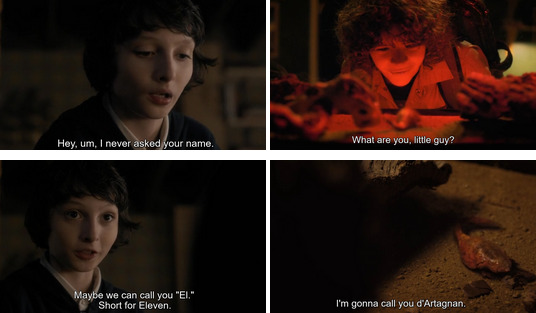
El was even paralleled to D’Art who, as we know, was a “new species” that literally came from Will’s head!
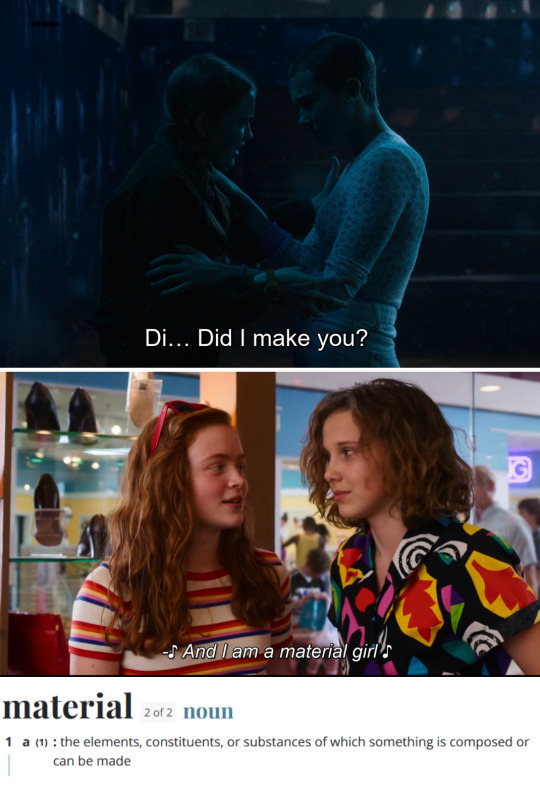
D'Art is a "new species" and El and Max are a "different species" aka "material girls". This implies that they all were created.

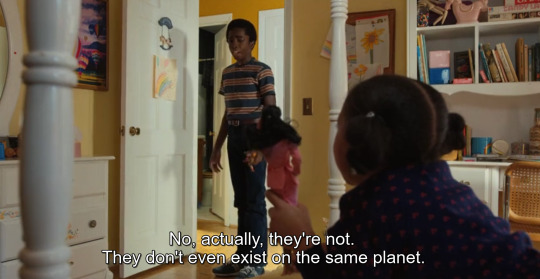
They aren't from Earth but instead they're from "another planet". We are given a hint to this in the shot above on the left. A globe (Earth) near another round sphere (Will's head...)
Relevant Media References Within the Show
Within the show, we have many references to other media- specifically media that contains a character with an alter-ego.

Superman is the simplest one to explain, so I’ll start with that. As we know, Mike said El was “Superman”, and that he was “Lois Lane”, prior to Will expressing his love for Mike using El’s name. The writers chose to reference Superman for a reason and it’s not just because El has powers or that Mike is gay. We are supposed to connect the dots and conclude that:
Will is Superman’s alter-ego: Clark Kent. The seemingly nerdy ordinary guy who loves Lois Lane but who is (secretly) Superman.

(Read the line from Lois above, it is incredibly relevant to Will and El)
Another commonly referenced movie within ST is The Neverending Story.

(Atreyu looks into the mirror and sees Bastian…)
The similarities between Bastian (bullied bowl cut boy) and Will are fairly obvious, as well as the similarities between Atreyu (the hero) and El. Well, it turns out that Atreyu was actually Bastian the whole time.
X-Men has also been referenced within the show.

Will asks Dustin for "X-Man 134" in the very first episode. This comic is significant because it was the first appearance of "Dark Phoenix".
In the book the Dark Phoenix is accidentally unleashed by the Mastermind who is tinkering around in Jean's brain trying to unlock the full potential of her powers. x
I argue that the "Mastermind" is actually Will himself who unleashed El into the world. He cast "fireball" unleashing El, the phoenix.
That's not the only X-Men clue however...
In the original Montauk script, it was X-Men 269 that Will asked Dustin for.
@threemanoperation made an excellent post about that here.
There are clear references to gateways and "splitting" which are incredibly relevant to this theory.
Karen's Novels

In this scene, Karen is reading a book called “Tender is the Storm”. In that book, there’s a surprise twist at the end:

These two "twins" that the main character is torn over end up being the same person.
Now keep in mind, the previous novel Karen reads also has clear relevance/foreshadowing. Credit below goes to @/kaypeace21, her post is here.
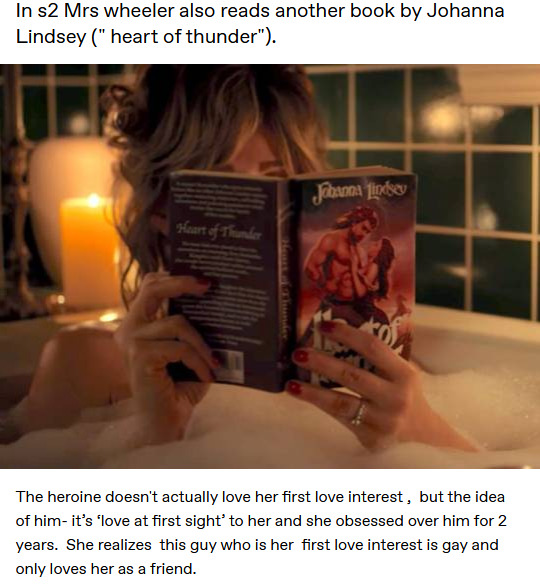
Sound familiar?
Hawkins Lab/Tunnels

Tunnels are something that we see a lot of... especially in Will's drawings in ST2. He draws tunnels from his mind... it's his mind map.
So... El came from Hawkins Lab, and escaped through these tunnels.
Hawkins Lab...
There's lots of subtle clues that "Hawkins" is metaphorically Will. Let me explain...
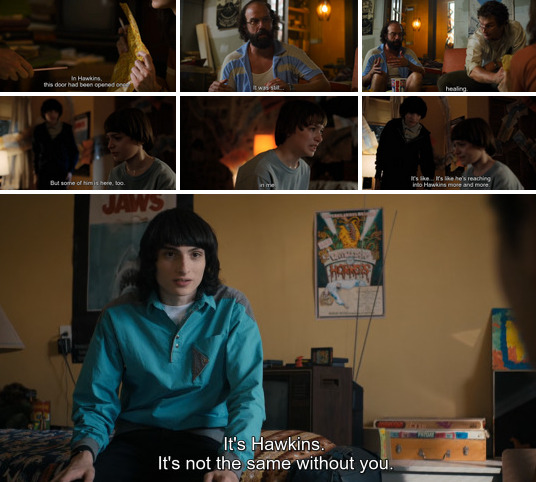
"Hawkins" is still healing from the gate being opened = "Will" is still healing from the gate being opened.
"But some of him is here, too. In me. It's like... it's like he's reaching into Hawkins [me] more and more." - Will
"Hawkins" isn't the same without Will because "Hawkins" *is* Will!
So El came from "Hawkins" lab = El came from "Will's" lab.
A laboratory is a place where things are created.

The mind is a "prison" as Papa states. Then we have Hopper and Henry comparing Hawkins Lab to a "prison"/El being a “prisoner”.
El is a prisoner of the mind…
Thus we can conclude: Hawkins Lab is Will's mind, and that is where El came from.
She was a prisoner of his unpleasant and traumatized mind who managed to escape into the real world.
El's Memories
The biggest question is... if El came from Will's mind, how does she have her own memories?
The answer to this is fairly simple:
El has Will's memories...

A major clue of this is in ST2. In a flashback, we see Hopper teach El Morse Code. Later on within the same season, we see that Will knows Morse Code...
Now I know this sounds like a stretch for some, but the major reason why is because we know so little of Will's past explicitly.
We have never seen Will and his father Lonnie directly interact. But through many many clues we can infer that Lonnie had a profoundly negative effect on Will. Not only was he obviously homophobic and a deadbeat father... but many clues point to him being so much worse. I talk about much more in this post.
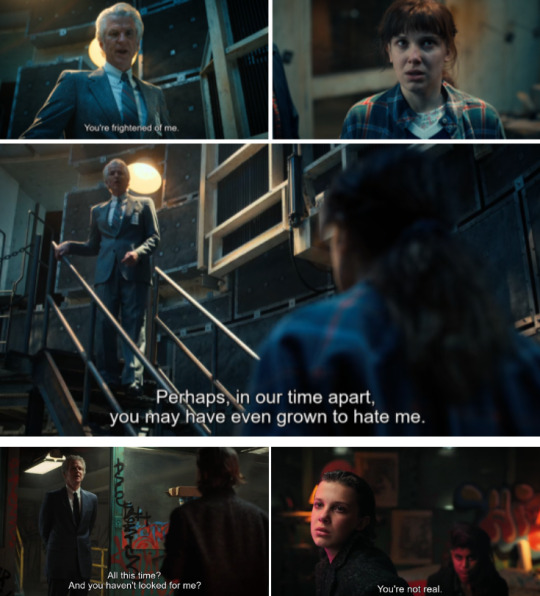
"Papa" may not be real, but rather a manifestation/altered version of Will's father.
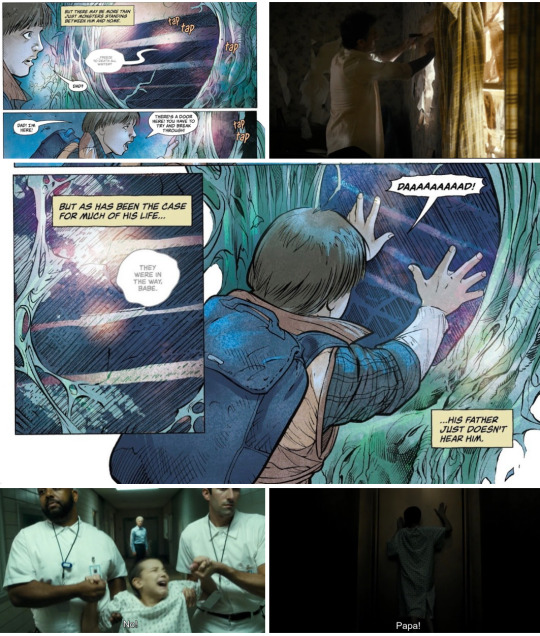
In one of the comics, we see a clear parallel here between El and Papa and Will and Lonnie. The father shutting out the child and ignoring their cries.
Perhaps the biggest clue of El having Will's memories, however, comes from 4x02.

Lets break this down:
In ST1, Jonathan tells us that his father forced him to kill a rabbit on his birthday and it was traumatic for him.
In ST2, March 22 is established as Will's birthday and we are told by Owens that "The anniversary of an event can bring back traumatic memories."
In ST4, we are told that "our brains protect us from trauma" by repressing memories.
In ST4, Will's birthday (the anniversary) is forgotten (repressed memories).
In ST4, on March 22, El has flashbacks to a massacre... and the song "Wipe Out" plays. "Wipe Out" can mean two things: to kill (a rabbit?) and to eliminate something completely (memories).
So... with all of that knowledge... wouldn't you say that it's interesting that El has traumatic memories on Will's birthday?
I think it's fair to conclude that:
Will experienced something very traumatic related to his father on his birthday (March 22), and he has repressed the memories. El, as the "Gatekeeper Alter"/superhero protecting Will/the system, has access to Will's memories.
Gatekeepers control access to specific memories or protected alters and can, in some cases, prevent unwanted switching. These alters aid in preventing traumatic memories from escaping from the alters who control them, thus throwing up amnesiac walls to protect the whole system. x
Which is why in the NINA plot line, it was all about El retrieving back memories... Will's memories. Or rather, altered versions of his memories.

Just to re-affirm the point that Will does not have his own memories... we were gifted with this subtle clue.
"Larry" is a nickname for Lawrence/Laurence. Lonnie is also a nickname for Lawrence/Laurence. So basically:
Will doesn't remember Lonnie. Or rather, he only vaguely remembers Lonnie.
El has Will's memories of Lonnie, and we see them through her flashbacks with "Papa".
This is exactly why we never see Lonnie or rather rarely have any direct mentions of him within the show. He is a deeply repressed memory.
I could go on about this because there are tons more hidden clues but this post will get FAR too long.
Why did Will create Eleven?
Wherever you go, the number 11 seems to find you - this is an angel number. x (credit to @thestrangestthing89 for pointing this out).
To answer this question very simply: Will created El as a replacement for himself. She was his "guardian angel" to protect him from his trauma, but also to erase him.
We really do not discuss this enough, but Will has crippling self-esteem issues! That's why he's so selfless and that's why he always tries to hide. He doesn't believe he's worthy of... anything.
El is a strong, brave, and socially acceptable version of himself. She has superpowers and she can be with Mike, because she's a girl. It'd be acceptable.
But over time we see that El could never replace Will, nor does she want to! El replacing Will causes everyone to be miserable. Will, Mike, his family, and El herself.
How it may be explained within the show
So, DID itself was not a term that existed within the 1980s, it was called "Multiple Personality Disorder". My guess, however, is that they will not use any specific medical term. They will, instead, use a DnD term:
"Changeling" x
According to folklore, a changeling was a substitute left by a supernatural being when kidnapping a human being. x

After Will vanished, El, a supernatural being, appeared in the same place. This whole time El was a "changeling"/substitute for Will.
El's Ending
El's ending has been a hot topic as of recently, for a good reason. People are scared she'll be killed off and express their discontentment with that. Will she be killed off?
Not exactly. Let me explain.
El is E.T., an alien who ends up returning back to their own world. The same thing will happen to El. As I explained, El came from Will's mind, and she will return to Will's mind! This will be her own choice, because she's not adapting to the real world. It's been a constant loop for her, and she's not happy. She hasn't felt like she belonged.
She's tired of being forced into roles that aren't her own.
El and Will will "combine" via fusion. This is where the "Little Boy" metaphor for Will returns. El came into the world via "fission" (splitting) and will return via "fusion" (combining back into Will).
The important thing to note here is that she will not "die".

As Henry states, she will live on in the mind. Most likely, a much more pleasant version of the UD. My guess is her ending will be similar to Frodo's at the end of Lord of the Rings.

(Notice how she disappears into Will? That's obviously intentional visual foreshadowing).
I have even more to say on this but this post has been long enough!
What are your thoughts?
182 notes
·
View notes
Text
I have been living with this headcanon/brainrot about Athena (both from Epic the Musical and pjo) for a long while and a warning for the faint of heart, you know what read it anyway cause it haunts me , so everyone else has to be haunted by it too, cause I am petty like that.
Most people might be aware of the myth that Athena sprung from Zeus's head fully formed and in battle armor, but a few might not know the preceding myth, so here's a quick recap:
Zeus married the titaness Metis, who was the titaness of wise counsel, wisdom, and planning. She was also Athena's mother. Metis was his advisor, both an indispensable aid and threat to him, given her power and cunning. But it's no Greek mythology without a son overthrowing the father archetype haunting the narrative. There was a similar prophecy about Metis's second child being so powerful that he would overthrow Zeus. Mind you Metis was pregnant with Athena when the following events transpire:
Zeus being Zeus, paranoid and power hungry, the King of the Gods and the God of "Justice" manipulates Metis into playing a shape-shifting game and when Metis turned into a fly , he swallowed her whole. [I know Greek patriarchs have a thing for eating their children or spouses pregnant with said children. Runs in the family, apparently]
Mind you in Greek myths, swallowed children, or in this case, swallowed wife pregnant with said child stay alive for a good amount of time even inside someone else's organs. So Metis gives birth to Athena inside Zeus's head and raises her there. She teaches her warfare and strategy until Metis herself eventually dies, i.e., her essence fades. Knowing what she must do to not meet the same fate, Athena hammers on Zeus's skull from the inside to escape. Everyone knows the rest of the myth.
But imagine Athena's first lesson being that the man she calls her father is the one who killed her mother and almost killed Athena herself by swallowing Metis so she must do everything in her power to survive and avoid that fate by staying on his good side. To try and fit in this twisted family of immortals, half of who hate her existence and half who are indifferent to him. So she does exactly that.
Think of Athena asking to be a Virgin Goddess from learning of what comes of marriage with gods.
Now, the continuation of Athena's myth is that she goes to Atlantis to train with the sea nymphs. There she makes her first ever friend and someone she comes to dearly love, Pallas. Greek myths being allergic to happy endings, one day when Pallas and Athena are sparring as they do a bit more seriously this time; Zeus being a nosy bastard decides to spy in just when Pallas is about to land a finishing blow on Athena. Thinking she might kill his daughter, he kills Pallas by blasting her with his lightning. Athena, being heartbroken , Zeus gave her Aegis as an apology. The continuation of this is that Athena adopts the namesake Pallas Athena and even carves a statue in likeness of her friend called Palladium and then more.
But think of Athena heartbroken and bitter as the Goddess of Wisdom learns her second lesson, then she must abandon all personal relations and sentiment before her father ends it for her in one way or another. For Pallas was the first true relation in her life after her mother.
Keep in mind that Pallas is Poseidon's granddaughter through his firstborn son and heir Triton. This is the point that sparks eternal enmity between Athena and Poseidon, and all those who come after will suffer in the wake of this tragedy.
So Athena chooses to remain alone and without a friend to avoid such a situation. Imagine Athena being hurt, especially brutally, when Odysseus says: "Since you claim you are so much wiser, why's your life spent all alone? You're alone!"
Because that's exactly it. Athena is wise. She knows the consequence of endearing herself to someone again so she stays alone to avoid such a thing and yet coming from someone who is so close to being her first friend in a long time, hurt and enraged she leaves.
Now, when finally Athena comes to terms with her friendship with Odysseus she finds yet again that her father Zeus struck him and his crew in a similar fashion to Pallas , yet again ripping her only friend away from her .
He is not dead yet, and Athena isn't about to let that happen. This time, she fights against Zeus, risks her life and position of being the favorite, and her survival method all because she can't bear to see Odysseus die.
Think of the agonizing fate of Athena, repeatedly being traumatized by her father yet having to do his bidding and stay on his good side to survive and live not for herself for she lives in misery but for the people who suffered for died for their association with her. In her eyes, she must suffer tenfold for letting this happen thrice, for all eternity under the man who so wretchedly ruined her life.
#epic the musical#the wisdom saga#greek mythology#athena#athena and odysseus#pallas#poseidon and athena#my goodbye#epic the musical brainrot is real#epic the cyclops saga#epic the ocean saga
249 notes
·
View notes
Text
Idk who needs to hear this but EPIC: the musical hot takes.
1. If the only source for Greek material you’ve consumed prior to this musical is Percy Jackson YOU LOSE THE RIGHT TO COMMENT ON THESE CHARACTERS. I’m so sick of seeing people commenting complete bonkers incorrect shit about characters that is literally only canon in the Percy Jackson series. For example. Calypso.
Calypso was not trapped on her island. Read the god damn myths. She literally only appears in the Odyssey. Ogygia is HER island. It’s kept concealed under HER spell. She’s considered by some to be a minor goddess and she’s a sea nymph. Ogygia is remote and the name was picked to give an air of being such a remote and primordial place. Other gods just don’t go there. That’s why she’s alone. She basically lives in the buttfuck of no where. She keeps Odysseus trapped because she falls in love and he doesn’t. In the myth it says Odysseus would go to the shore and weep by day and by night Calypso would weave and sing and enchant him, forcing him to spend his nights with her. It is very much implied she rapes him. 😐 Stop fucking defending her. In the EPIC version, Jorge has stated he did not write his specific Calypso to have assaulted Odysseus, but she still kept him trapped against his will. Stop fucking infantilising her. She’s not a child. She knows what a wife is. She knows what she’s doing is wrong. She’s a manipulator. She is not a victim.
2. Stop infantilising Polyphemus. This also goes back to some of the Percy Jackson shit. (I love these books but yall gotta grow up) He wasn’t a toddler (have no fucking idea where this came from) and he wasn’t bullied by other cyclopses. That’s just a Percy Jackson thing. Odysseus didn’t even kill the sheep. They found a cave full of provisions, Polyphemus came home, and instead of being a gracious host, he started eating Odysseus’ men and kept them prisoner for a few days. Odysseus gave him strong wine, said his name was Nobody, and blinded him while he slept. They escape the cave by tying themselves to the bellies of the sheep so Polyphemus wouldn’t feel them when they left. When the other cyclopses came to see what was wrong with Polyphemus and he said Nobody hurt him, they told him “pray about it”. So he did. That’s why Poseidon takes revenge.
3. For some reason I see a lot of people not giving Penelope the praise she deserves. For some reason she’s not considered smart and cunning like Odysseus, but just strong and militaristic because she’s Spartan, which is insane. Firstly, a lot of the common knowledge we get about Sparta was ancient propaganda from Athens (their counter part) because Spartan women were better treated and were allowed more rights than Greek women were. Spartan women didn’t go to war, they were simply allowed to roughhouse and develop their bodies the same way as men. They were well educated. Spartans believed strong women birthed strong men. Penelope was Spartan, so she was allowed to be physically fit, but her strengths were her cunning and intellect.
4. Penelope did not sit behind the axes. Let me say it again. PENELOPE DID NOT SIT BEHIND THE AXES. This is an intelligent woman. She set the challenge because she already suspected Odysseus had returned home and was setting a challenge that literally only he could complete. It was to sus out which one was her husband because Athena had disguised him so he could enter his own palace and spy on the suitors to understand what was going on. Penelope wouldn’t sit behind the axes waiting to die if someone actually managed to shoot the arrow. And the suitors aren’t stupid. They wouldn’t shoot anyway because that would kill the one lady they’ve been fighting to fuck for 20 years. Another example of her cunning intelligence is when she asks Odysseus to move the marriage bed. It was common in myths for Zeus to take the image of a woman’s husband and trick her into sleeping with him. So she set a task only her real husband would know was impossible. “Move the wedding bed.” If he tried, she would know he was an imposter. If he protested because it was impossible, then she would know it was really her husband standing before her.
5. Eurylochus hate is so frustrating. I get it, he opened the wind bag when they were practically home. I get frustrated with him too. Like homie you couldn’t wait 20 minutes?? But a lot of people seem to fail to see the point of Eurylochus in the story. He’s there to be human. He’s there to show real human flaws that we all struggle with. He opens the windbag because of curiosity and paranoia. He’s scared of Circe and fights for self preservation over saving the men. He feels guilt over opening the windbag and it eats him up until he confesses. Then he sees the one person who has been the guiding light for their crew seemingly sacrifice six men without explanation. That’s terrifying. He’s also angry because they went through so much and now their captain is just choosing to let people die so he can get home. When they reach the island of the sun cows, he’s hopeless, desperate, starving, and ready to give up. He kills the cow because either they get to eat and maybe survive a bit longer or at least they might die with a full stomach. Eurylochus is the most human one there having real human reactions to a situation that Odysseus is seemingly immune to reacting normally to.
6. Eurylochus and Polites did not have children. I don’t know where this came from. Polites is also a very minor character in the Odyssey. He’s mentioned twice as a dear friend and that’s it. We don’t even know at what point he died in the Odyssey either. Stop inventing shit that doesn’t exist.
EPIC: The Musical is a work of art. I love it. I was in the 1% of Spotify listeners last year and I’m hoping to end up in the #1 spot this year. I genuinely love this musical so much. But the amount of people making shit up without doing any bit of reading pisses me tf off. It’s literally so simple and easy to look up articles on mythology and learn all of this shit in a matter of minutes. Educate yourselves. Myths were invented as some of our first stories and were often used to teach lessons. It’s important to educate and understand the things you read, read deeper into the meanings of what you read, and know how to pick up on shit that’s inferred.
God I hate tiktok.
#i am not mentally well#epic odysseus#odysseus#polites#eurylochus#epic the thunder saga#epic penelope#epic the troy saga#epic the ithaca saga#epic the vengeance saga#epic the wisdom saga#epic the musical#epic poseidon#epic fanart#epic athena#penelope#calypso#circe epic the musical
89 notes
·
View notes
Note
Ok but omega ody going into labour while with Athena. She brings out an axe to help and then is utterly traumatised because why do mortals birth like that she thought offspring came out of the head?! Also why is the baby a baby not a fully grown adult 😭😭😭
I absolutely think Athena would be way more in touch with mortals than this but yeah sure why not:
For Ody to go into labor with Athena around, I think he'd have to be otherwise alone. So maybe he snuck out of the palace because he was sick of constantly being hounded by the royal physicians. No doubt his mother would also constantly smother him and order the servants to do the same.
Athena joins him and they take a little walk together. Neither of them think anything's wrong until Odysseus stumbles over himself. Athena catches him, but they both smell... something in the air.
Ody looks down and boom, his water broke.
Athena thinks nothing of it. She summons a small axe to one hand and a chisel + mallet in the other, asking Odysseus which he'd prefer.
He looks at her like she's crazy and says he needs to get back to the palace ASAP. Athena is like "Oh of course. Mortals die of childbirth all the time. Well, they do tend to perish when their skulls are cracked open, so that makes sense."
She uses a bit of magic to get them there faster, masking herself from everyone but Odysseus' sight as the servants hurry him to his birthing suite. They get him settled on the provided bed and do all sorts of things to calm him down, like massaging his muscles and rubbing his skin with warm oil. Athena is like "Yup this checks out. Definitely don't want to be stressed when they crack your head open."
She even keeps quiet as a priest prays to Artemis for a safe birth for both the child and the dam despite Athena being right there. Because surely, at any moment now, Odysseus will ask his dear mentor to do the honor of delivering his child. After all, what mortal's hand could possibly be more steady or precise than her own?
Athena is honestly a little excited and a little nervous. She's never delivered a human's offspring before. But she doesn't trust the midwives or physician to do the cutting and/or splitting. What if they accidentally kill Odysseus?
As someone who's vanquished many foes in battle, she's confident that she can get Odysseus' head open just enough for the child to pass w/out killing her mentee. And right now, Odysseus is looking quite stressed and seems to be in a lot of pain. There's some blood coming from his lower area but hey, maybe that happened when Zeus bore her as well. Or maybe it's a human thing.
Athena startles at the first of Odysseus' screams. This isn't a low whine to indicate discomfort. It's not a battle cry, either. It's a sound of pure pain. As soon as he empties his lungs, the midwives & his mother + wife get him off the bed and seated on a strange chair with a large portion of the seat missing.
(Two notes- I think it's insane that it was common practice in ancient Greece for women start labor by laying down and THEN getting moved to a birthing chair because like... idk about you, if I began to experience the worst physical pain of my life I wouldn't want anyone manhandling me.
And two- I HC Odysseus' mother as an omega. So she'd definitely be there to coach her poor son through his labor. Also, despite childbirth being strictly regarded as an omega's ordeal, I do think Odysseus would want Penelope to be present. She's still a woman so there's not too much taboo crossing there. And having her familiar scent nearby is really comforting to him.)
At that point, it finally crosses Athena's mind that humans give birth very differently from how she was created. There is so much blood and other bodily fluids, it's wet and smells terrible, Odysseus is red in the face from his screaming and exhaustion, and it goes on. For. So. Long.
Hours. All night and into the morning, Odysseus is pushing and pushing and Athena is just watching from the corner of the room and wondering which other god cursed her poor mentee with this demon of a delivery. Because surely, this isn't normal, right?
At one point, Penelope put her hand on his shoulder to calm him down and Odysseus physically snapped at her and bit her hand.
Penelope doesn't pull her hand away, she doesn't even flinch, not until Odysseus lets go of his own volition. He seems to have gone downright mad. At another point in the birthing process, he screams at his midwives and even his own family to be quiet, even when no one is speaking. He yells at them not to touch him even when no one is.
Athena is horrified and bewildered by his behavior but literally everyone else in the room acts like it's completely normal. Like this is expected.
"Yes, Odysseus," his mother murmurs, having been on her feet for hours and yet not tired at all, "Let it all out. It'll be alright..."
"Stop telling me that!"
And his mother continues to hush and shush him, no fear or anger on her face. Only love and concern.
Athena wishes childbirth was as easy as making a neat split in Odysseus' skull and pulling the child out. Whatever in Hades this all is... it is beyond even her comprehension.
At long last, a tiny fleshy thing drops out of Odysseus and into a midwife's waiting arms. It's cleaned and dressed in white cloth, with the staff declaring it's a boy!
Odysseus slumps in the chair, at last being able to cradle his son. Penelope leans over his shoulder with a smile and all at once, his sanity seems to have returned to him. Odysseus smiles, exhausted but clearly very happy, as his alpha kisses him on the cheek.
Penelope says, "Well done, my beloved."
She's crying, as is Odysseus' mother. Tears of joy, no doubt. Odysseus seems to have shed every tear he could possibly have as he finally gets to recline and relax.
In all his life, he's never looked so fragile, so mortal.
Odysseus spots Athena in the corner of the room and asks to be left alone for a moment. He wants to pray, he says. It takes a great deal of convincing for his mother & wife to leave his side, Penelope seems intent on being removed only by force, but they don't want to argue with the poor omega who just spent 12+ hours giving birth. Odysseus assures her it'll just be for the shortest moment.
When it's just the three of them, (Ody, Athena, and Telemachus) he asks if she wants to hold the baby. Athena politely but swiftly declines, thinking the little thing in Odysseus' arms must be as soft as clay and just as easy to misshape.
Curious, Odysseus asks her what it was like to watch.
"It was... unlike anything I've ever seen."
Odysseus smiles softly. It seems he has no strength to laugh.
He asks her a question that catches her by surprise, "What was I like?"
"What do you mean?"
Odysseus truly doesn't remember long stretches of his birth. He asks again what he was like. Athena decides he doesn't yet need to know about how he snapped at everyone in the room. Now, she can see it was only a coping mechanism for someone in terrible, terrible pain and all the mortals understood that far before she did.
"Rest, Odysseus. You've fought a great battle," she says, before taking her leave. She flies out of the window in the shape of an owl and heads to her abode on Olympus. Athena sits down at her loom, the pattern for a baby's blanket already fully drafted in her mind.
#omegaverse au#epic odysseus#epic the musical#omega odysseus#alpha penelope#tw pregnancy#odysseus x penelope#poor athena#she's been traumatized
101 notes
·
View notes
Text
How did Aristaeus get Hestia?
Well... Get is such a strong word.. and It's not Aristaeus got Hestia. It is Hestia who got Aristaeus. You see, when Hestia made her vow of maidenhood, she didn't say she would withhold love, just the act of sex. She just doesn't want to wed someone she raised (Poseidon) or someone who would force her into the spotlight (Apollo).
So when Aristaeus visits her, she knows that he is the one. He is what she wanted. He is not in any spotlight, as The End is always there, watching in the shadows. He's kind, loving, a great father seeing how he raised his wards, loyal and finally, have the same understanding as her when it comes to sex. Necessary but ultimately unneeded. Besides, his task isn't all that much in a way, not like his sisters who are ever so busy. The two of them can just... Sit near the fireplace, cuddle as they split their attention to any temple that they believe is in need of visiting as well as different homes.
Bc of how introverted they are, there are only five myths that tell their stories. One is their relationship, one is their raising of Alexander the Great, one is Pompeii, the other is during the war of the Giants and lastly is the birth of King Arthur.
Ps. Hestia was the one giving the bride price for Aristaeus much to the confusion of Poseidon and Athena and Zeus.
Pss. If there were a modern wedding, Aristaeus would wear a wedding dress while Hestia is in a tux. Aphrodite squeal at this.
48 notes
·
View notes
Text
Ω PJO DEMIGOD HEADCANONS: 👑HERA: QUEEN OF THE GODS, GODDESS OF MARRIAGE, WOMEN, MARTIAL HARMONY, AND THE PROTECTOR OF WOMEN DURING CHILDBIRTH 💒
Author's Note: Hi everyone, so some of you have been expecting this. I wasn't lying that I hadn't give it some thought but I didn't write this earlier since I wasn't sure how I could make it work. It might not be what you guys expected but here it is. This is going to be a stretch and please suspend your expectations for this. This is for the anons who asked if I could do Hera. I tried. This is what I came up with. Thanks for reading, liking, and reblogging! I really appreciate it! [PJO DEMIGOD HEADCANONS MASTERLIST]
*Warning: Immense wall of text below [Keep Reading]
I can only see this happening, given that Hera is very loyal to Zeus, and how a demigod child of Hera is born.
You’re a child of Zeus when the King of the Gods became mortal (SOMEHOW) temporarily and Hera supported him like the loyal wife she is.
You’re either born like how Athena births her children, where Hera thought about (a) mortal man, or like Hebe (in some mythological records) where she was born from Hera eating a piece of lettuce, from Hera by herself, but was somehow born half-mortal, instead of immortal.
You were crafted out of clay by Hera? Maybe???
You were born when Hera had become mortal herself (SOMEHOW????), born with Zeus’s help *COUGH*.
Regardless, your existence or any other demigod child of Hera is unheard of. Like it was not even a thought of possibility.
No one is sure how to proceed or wrap their minds around your existence. I don’t think you’re told how you were born, but even if you were told, you’re sworn by the River of Styx not to tell anyone except outside a few very selective approved individuals. This is because out of the listed reasons above, only one doesn’t insinuate anything relating to the King or Queen of Gods being mortal; which would reveal a weakness to the two monarchs of the Gods and the harmony of peace among the gods, or indicate Hera of cheating which would break the foundation of marriage and the law behind it. This unfortunately creates a lot of gossip behind your back about your godly mother and you’re the physical representation of it. Something Hestia herself tells you about, in a disapproving way to your godly parent.
There are immediate renovations to the Hera cabin, mostly because it is not livable at all. You’re temporarily put in the Big House until things are done to the Hera cabin. Annabeth has been given an official ‘pardon’ by Hera because of this, so there’s that? At least.
Annabeth isn’t sure how to interact with you, given Hera’s clear distaste to her, and how you’re her daughter, but at the same time you’re also innocent.
Percy is also a bit conflicted given Hera was the one who gave him the amnesia and the whole camp Half-blood and Jupiter thing, but he goes about it a bit easier because he knows all about bearing their godly parents misdeeds and grudges and all that.
On the other hand, you’re living with the knowledge that by technicality, a lot of people could’ve been married under the Ancient Greek laws. For example, Percy and Annabeth could be or would’ve been married when you heard that they were playing hacky sack with an apple and if Percy threw the apple at Annabeth, and she caught it, it would’ve technically counted as “accepting a marriage proposal”, and they were married-
Your mother’s domain is technically powerful and important but at the same time, it’s not very useful to you; considering there’s a lack of married individuals among the campers and the only one who is married is Mr. D, but you don’t dare to. But it’s not like you can do anything anyway since he is a god and you’re just a demigod…that and he’s been avoiding you.
Mr. D just avoids you and you’re not sure until someone tells you that Hera tricked his mother, Semele, into making Zeus reveal his true form to her to prove he was Zeus, evaporating her.
If Camp Half-blood has the aura of uncertainty, then Camp Jupiter is the opposite. The treatment towards you is the opposite where they treat you with reverence but because Juno is so revered, being her child makes you feel isolated.
The cabins that are at odds with you are the Aphrodite, Zeus, Athena cabins, while the cabins that are more cordial with you are the Hebe, and surprisingly the Ares and Hephaestus cabins.
At least there are a bunch of beautiful white lilies at Hera’s cabin, making the cabin more of a place to live than a renovated temple. The lilies are there because it is said they were born from her.
Argus is also your bodyguard for a reason. He was created by Hera for the sole purpose of being a guard and watchman, and considering you are the daughter of Hera, you fall under his duties. Not long after you were born, when you have grown out of the age protection Hera can protect you from, and Hebe when you’re past 8 years old, the monsters start coming into droves. There are monsters immediately trying to kill you, not just fueled because you’re a powerful demigod, but because of also Lamia, who she personally comes hunting for you. This is because Lamia, when she was a mortal queen and had the eye of Zeus, Hera was responsible for killing all of her children and became what she is now, and is also responsible for monsters hunting demigods to this day. Argus is only able to protect you only for so long so sharpen your skills and fight for your life.
When you get claimed, the world goes absolutely silent. Everyone stares upon the claim mark floating above your head, a peacock, like its a crown above your head. The spread feathers of the peacock does certainly make it look like one. With a crown above your head and a field of white lilies sprouting beneath your feet like a white carpet, it almost makes you think you’re a child of royalty being announced. But you don’t let yourself be that deluded much longer. They stare at the mark longer than you like to admit, some blinking and rubbing their eyes as if they are seeing an illusion. You already know who your godly parent is, so you know the claim is just a message to Camp Halfblood.
That you are the demigod child of Hera. A being that has not been thought of to even possibly exist. An impossible existence.
Yet here you are. And you knew how. And yet you couldn’t tell any of them because Hera made you swear to not reveal that information to anyone outside of a very selected few confidants. If they knew any of the truths, then it would break the balance of the gods and would bring chaos to them; threatening them and you.
The claim begins to fade, disappearing into glittering lights and as it falls upon you, so do the campers’ eyes. Thousands and thousands of eyes stare at you, not for you, but what you are.
Argus stands beside you, standing like a guard and his protective stance only adds to the confirmation.
Mr. D drops his can of diet coke and as it splatters across the floor, Chiron finally breaks out of his stupor. He kneels and bows before you, his limbs shaking a bit as he stutters as he announces.
“The bloodline is determined. Hera, Queen of the Gods, Goddess of Marriage, Women, Martial harmony, and protector of women during Childbirth. Hail, [y/n] [l/n], child of the queen of the gods.”
There is silence before chaos erupts as everything is turned over their heads.
#percy jackson and the olympians imagines#pjo imagine#pjo imagines#pjo#pjo fanfic#pjo reader insert#demigod h/cs#demigod headcanons#demigod imagines#hera#child of hera#percy jackon and the olympians#heroes of olympus#annabeth chase#percy jackson#demigod reader#demigod imagine#demigods#major gods#major gods demigod#hera demigod
363 notes
·
View notes
Text
Was Athena a Feminist or a Female Misogynist?
Athena is perhaps the one most famous goddesses from Greek Mythology, and was for a very long time considered a good role model for women and a feminist due to the fact that she's a smart woman who can fight in battles. However, there are also a lot of people who claim that she is in fact a female misogynist and consider her to be the original "pick-me girl" or "I'm not like the other girls" girl. And the fact that she's seen besides male heroes most of the time or the myths of Medusa and Arachne doesn’t make this situation any better.
And the very first problem in this equation is that people are using a lot of modern terms (and a modern mentality in general) in order to label a figure that was firstly mentioned thousands of years ago. So there's a LOT to unpack here.
The first mentions of Athena come from mycenaean mythology. Back then the place that later became Athens surpringly had a matriarchal view on society, which would explain why Athena as a female figures isn't depicted in a traditionally feminine way. But years have passed, and things have changed a lot both socially and culturally. Athens, despite of being one of the most developed cities from Ancient Greece, had a very patriarchal view on society, to the point where even the other cities considered it to over exaggerate. In order to understand just how misogynistic athenians were, they believed not only that the woman is a disfigured version of the man, but that men could find a way to reproduce themselves without the help of women and that the female is nothing but a vessel when it comes to reproduction.
The thing is that, while a lot of things changed in the Athens in time, the goddess that was the patron of that city remained the same. So the question that naturally comes is: If women are inferior to men, then why is our patron deity a goddess? And so, the only play which specifically depicts Athena as a female misogynist appeared: Eumenides. This play was obviously written by a male Athenian, and its pure intention is to answer to that question. In the Eumenides, Athena says this thing:
It is my duty to give the final judgment and I shall cast my vote for Orestes. [735] For there was no mother who gave me birth; and in all things, except for marriage, whole-heartedly I am for the male and entirely on the father’s side. Therefore, I will not award greater honor to the death of a woman who killed her husband, the master of the house. [740] Orestes wins, even if the vote comes out equal.
As you can observe from this quote, the dialogue is ment to confirm the ancient athenian perspective about reproduction, as well as their views on women in general. Despite the fact that Metis was supposed to be Athena's mother since she was pregnant with her when Zeus ate her, in this play she is completely erased and Athena has one single parent figure: Zeus.
In other words, Athena was clearly a product of the society that worpshipped her; a society that believed that traits such as high intellect or strenght cannot be attributed to women. It is up to you guys to decide wheter the Eumenides is canon to the rest of Greek Mythology or not.
However, aside from this particular play, Athena shows no ill-will towards women purely for their gender. She had a very close relationship with Pallas to the point where she even takes her name after she killed her by accident (Thank you, Zeus!), and acted as the big sis towards Artemis and Persephone, as it is suggested in Homeric Hymns to Demeter.
Furthermore, if you ever read the Iliad then you would observe that her interactions with mortal women are very different compared to those with Medusa or Arachne from Roman Mythology.
In the Iliad, Athena gifts Penelope in handicrafts, wiles, and storytelling, making Penelope an anti-Arachne due to the fact that she isn't punished by the goddess for her talents, but rather blessed for them.
Athena has endowed her above other women with knowledge of fair handiwork and an understanding heart, and wiles, such as we have never yet heard that any even of the women of old knew, of those who long ago were fair-tressed Achaean women— [120] Tyro and Alcmene and Mycene of the fair crown—of whom not one was like Penelope in shrewd device…
At the same time, we have the story of Cassandra and how Athena avenged her. Cassandra was brutally raped by Ajax the Lesser in her temple. She asked Athena for revenge, telling her what happened to her. Athena was absolutely livid, sent a storm to wreck the Achaeans' boats when they failed to kill Ajax, then destroyed his ship near the Whirling Rocks and left him to die, or lifted him in the sky during a storm and impaled him with her father's thunderbolt. At this point, Cassandra is an anti-Medusa, because she was avenged instead of being punished for being raped. Furthermore, in the original greek myths Athena herself was about to be raped by Hephaestus at some point. She was very aware of the fact that there's a difference between a woman who had sex on her own will and one that didn’t consent to it, so it makes no sense why she wouldn't help a rape victim.
Medusa and Arachne were later additions by Ovid, and their stories were anti-Authority Propaganda.
So instead of quickly coming to any sort of conclusion and deciding wheter or not Athena was a Feminist or a Misogynist, perhaps people should understand the fact that the situation was way more complicated as she was nothing more than a character that was depicted both according to the societal and personal views ancient greeks had on women (which were more or less different depending on the century and the poet), and that the answer is way more complicated than we think.
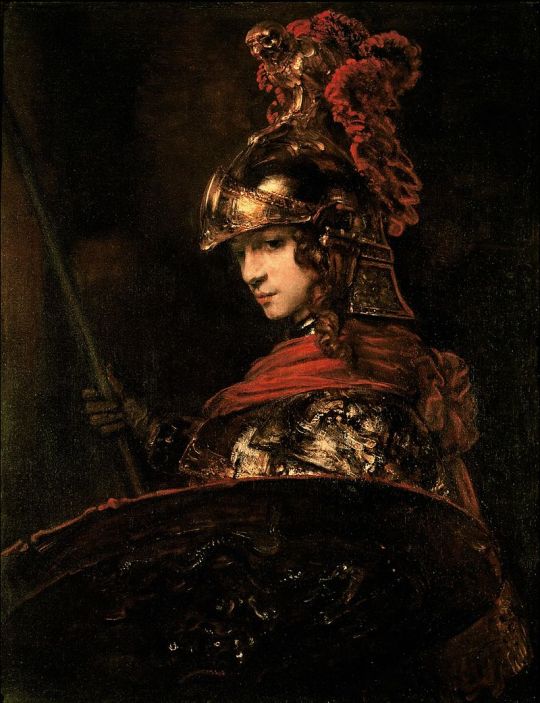
196 notes
·
View notes
Text
Hera caressing the scar on Zeus’ forehead after Athena’s birth. I miss her, Zeus speaks to her, in the quiet solitude of no one else there, knowing only Hera is the only one he can talk to about this… this vulnerability. The mask beneath the strongest of the Gods.
The one being of the past who meant so much to Zeus, the sister Hera had that was not bound by blood, the only woman that Hera will say for certain she is not jealous of. Not when Metis wormed her way into her heart as well. Not when Athena looks at her with those same gray eyes.
Tis would’ve loved her. She hums to agree.
Her warrior spirit is all Tis, she speaks back, but Athena has none of her temper.
No, Zeus laughs. That’s all me.
A look shared between two now flood with tears. No words left said, two hands interlinked, as if to ground each other from their grief. Athena will never have her mother back, and Tis will never see Athena grow and learn and flourish. And as unworthy as they are, are resolved to be parent enough for the new goddess. And for Tis? They will try.
#old wip i decided to post#oh god this one is two years OLDDDD wtf#but sure. have some zeus-hera-metis tidbit#greek mythology#hera#zeus#metis#athena#zeus x hera#xan writes#ok bye!
60 notes
·
View notes
Text
who was zagreus?
hey y'all, on the post "who are the chthonic deities?" i got a comment asking about Dionysus not being included in the list. ever since then i've been thinking a lot about doing more research on the god Zagreus, who Dionysus is a reincarnation of.
Zagreus, the main character of the video game series Hades, is very different to the mythic Zagreus. mostly in the way that there really wasn't a lot of lore about Zagreus, at least not the same level as Dionysus. most of his stories come from Orphism, or the cult following of Orpheus.

DOMAIN: god of pitfalls, game hunting, and chthonic sacrifices
BIRTH AND DEATH: before she is given to the Underworld, Demeter hides her daughter Persephone away in a cave to ward off her many suitors. however, Zeus, as is typical of his mythic self, changes form into a drakon (a dragon-serpent), and makes love to her, conceiving the horned child Zagreus. the infant is then brought to Mount Ida, where he is to be raised in much the same way as Zeus himself. even as a child, Zeus takes a liking to Zagreus and whisks him away to Olympus, intending him to be his heir. there he is allowed to climb the heavenly throne and wield Zeus' lightning bolts.
however, Hera then becomes jealous, and incites the Titans to kill him while she distracts the boy with toys. the Titans then chop him to pieces, and in some stories, they then cook and eat the corpse.
Zagreus is also identified as the son of Hades and Persephone, however, and other sources use Zagreus and Hades interchangeably. whether this is a separate deity from Orphic Dionysus-Zagreus or not, the two are now intrinsically linked.
REBIRTH: Zeus, finding out about Zagreus' death, enacts his rage on the Titans with great rain and lightning, and blasts them apart. from these remains, the Orphics said, humanity arose (giving us the evil nature of Titans and good nature of Gods). Zeus then goes to rescue what he can of Zagreus' remains (or Athena does), and all that is left is his heart. there are many different versions of what happens next, whether Apollo is given the remains to be buried and Zagreus is reborn as Dionysus by Rhea/Demeter OR Zeus makes a potion of what is left of his son and gives it to Semele, who births Dionysus.
Dionysus' association with Zagreus would further explain his ability to go and bring people back to life, including his mother Semele and wife Ariadne.
SYNCRETISM: Dionysus-Zagreus is often compared to Osiris, and his rebirth with the help of Isis (who is associated as Demeter). the posthumous conception of Horus, as well, may relate to the "second birth" of Dionysus from Semele's dead body. there is further evidence relating the mysteries of Osiris/Isis and the mysteries of Dionysus/Demeter.
SOURCES: theoi.com wikipedia britannica
#hellenic deities#hellenic pagan#hellenic polytheism#hellenic worship#hellenism#helpol#ancient greece#ancient greek#chthonic deities#greek gods#chthonic#hades#persephone#dionysus#dionysos#orpheus#orphism#hellenic paganism#greek deities#greek mythology#ancient greek mythology#deity#deity worship#deity work#deities#paganism#polytheism#pagan#pagan witch#paganblr
48 notes
·
View notes
Text
IN BETWEEN. charlie bushnell x reader – 01
01 | SPARKS FLY previous | next | masterfile
SYNPOSIS. when a girl's co-star is good to her and now she wants it more than everything in between. (smau)
A/N. this chapter is more like world building (it's where i explain what the fuck i'm doing with the YN okay)
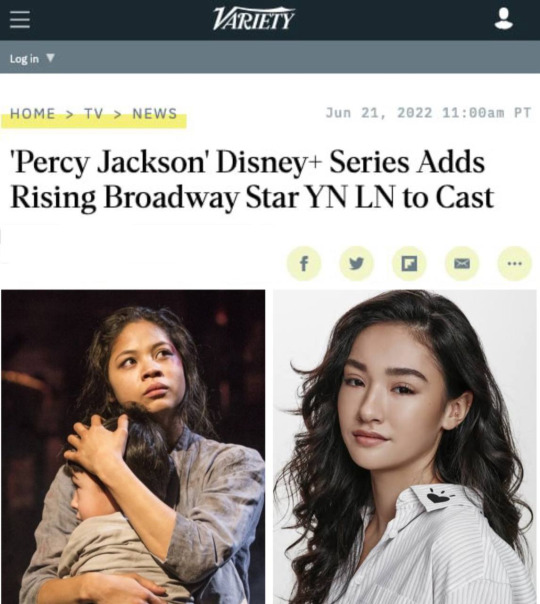
The "Percy Jackson and the Olympians" series at Disney+ has added an unexpected pick to its growing cast.
The new live-action series is based on the hugely successful novels from author Rick Riordan of the same title. We will be seeing YN LN join the series as Rina Velasco, one of the supporting characters of the show.
LN's Rina Velasco is referred to as "the offspring of The Muses, goddesses of the sciences and the arts." Unlike most other demigods, she is born out of the artistic and scientific output of the muses. When the moral ingenuity of humans meets the divine musings of The Muses. Her character is described as a unique allrounder who becomes a mentor figure to our main cast as they embark on their journey.
This will be LN's first on-screen role of her career. LN's experience mostly lies in Broadway, she is known for playing Kim in the Miss Saigon revival on Broadway. LN was nominated for a Tony in 2022 for the same role. She is repped by Salonga/Chien Entertainment and B817 Agency.
Riordan posted on the Meta app, Threads, about this update to the casting saying: "YN was one of the actors we didn't expect to see a tape of but when we saw it, we couldn't help but fall in love with her. She embodies the spirit of Rina so well and is such a kind spirit, we can't wait for you to fall in love with her too! Welcome to the cast, YN!"
The live-action show is based on Rick Riordan's Percy Jackson book series. It tells the fantastical tale of the titular 12-year-old modern demigod (Scobell), who's just coming to terms with his newfound supernatural powers when the sky god Zeus accuses him of stealing his master lightning bolt. With help from his friends Grover (Simhadri) and Annabeth (Jeffries), Percy must embark on an adventure of a lifetime to find it and restore order to Olympus.
Production on the show is now underway in Vancouver. Riordan and Jon Steinberg are writing the pilot with James Bobin directing. Steinberg and his producing partner Dan Shotz are overseeing the series and serve as executive producers alongside Bobin, Rick Riordan, Rebecca Riordan, Bert Salke, Monica Owusu-Breen, Jim Rowe, Anders Engström, Jet Wilkinson, and Gotham Group's Ellen Goldsmith-Vein, Jeremy Bell, and D.J. Goldberg. 20th Television is the studio. Salke was formerly the president of Touchstone Television and originally put the show into development.
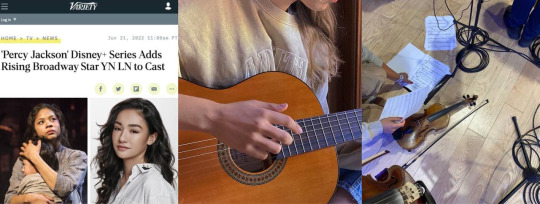
liked by percyseries, iamcharliebushnell, and 37,789 others thelnarchive the child of the muses @percyseries
percyseries OUR MUSE!
user1 this is literally perfect casting who cried i did ↳ user2 she's so rina coded! thank the gods for the casting directors
iamcharliebushnell only muse in my life ↳ thlnarchive only traveler in my life ↳ user3 the way filming hasn't started and they're already like this ↳ user4 their chemistry is chemistry-ing
user5 roman empire. she is my roman empire.
dior.n.goodjohn i LOVE LOVE LOVE women ↳ thelnarchive HELP i love you
user6 this is so fcking random but i NEED her in a taylor swift music video
A/N i truly hope you guys can forgive the horrible editing in the pictures. the article portion is based on (and has some parts that are directly pulled from) this article from variety ! here's some succint information about rina velasco, the PJO character YN LN plays (and is my childhood OC!) - rina velasco, filipino, 18 years old (year younger than luke) - she's an offspring of the muses, not directly a child or daughter, though she may be referred as such - by her being an offspring of the muses, i mean that she was born in the same way athena's children are born. - but in rina's case she's more like a weird conglomeration of each muse. her birth is a rare event, but her mothers are honored as minor goddesses so she stayed in the apollo cabin (connection to music) - rina operates as a guidance figure for the main trio, especially annabeth - she's also luke's love interest, there's a lot of tragicness and doomed romance stuff with those two - and for the sake of everyone, we pretend like the weird i love you from the books didn't happen !
#luke castellan imagines#luke castellan x reader#percy jackson imagines#percy jackson and the olympians imagines#percy jackson#percy jackson and the olympians#percy series#pjo#pjo series#pjotv#heroes of olympus#luke castellan#charlie bushnell x reader#charlie bushnell#charlie bushnell imagines#smau#pjo smau#pjo tv show#percy jackson tv show#percy jackon and the olympians#percy jackson smau#pjo au
280 notes
·
View notes
Text

Sooo… do you know that story about Athena being arranged to marry Hephaestus?
This was partly inspired by @mer-acle's drawing of the same myth. I wanted to draw something for it to but wasn't sure what and then... inspiration stuck "Ah Ha! I'll redraw the reluctant bride by Auguste Toulmouche, but like, with Athena!" Which makes this probably the nerdiest drawing I've ever done. But I mean how could I not that death glare is iconic!

This is such a fascinating myth, it has such interesting implications for Athena's family relationships, and Athena as a person. Like not only was she married off despite her clearly wanting it, but nobody did anything about it, she had to get out of it herself. Like that hurts but the way she responds is so wonderfully in character for a much younger Athena.
In the original myth Hephaestus asked to marry Athena (by which I of course mean he asked Zeus what kind of hooligan would ask a woman if she wanted to marry him). But i kind of like the idea I've been playing with of Hephaestus not wanting it either, just because this story really highlights the fact that they have so much in common. They were both born in unusual ways, got abandoned at birth because of it, and when they got back to Olympus LIFE STILL FUCKING SUCKED. I also originally started exploring this myth as a way to have the Erichthonius myth because I love him, and keep Athena and Hephaestus's friendship.
bonus original sketch:

#yeah it had minor flaws when i coloured it so i made some edits in procreate. I love living in the future!#i may do a fully rendered version of this but I might not post it depends if it's any good#characters from right to left are Hera Athena Demeter and Persephone in the back#quite proud of my inclusion of Persephone here because of what the girl in the painting represents#even if she didn't reeeealy turn out that well here#athena#tagamemnon#athena greek mythology#auguste toulmouche#greek gods#my art#greek mythology#by golly it's been a long time since I've posted my art on here!
54 notes
·
View notes
Text
The Absortion(Swallowing) of Metis and why it was an act of Devotion (From Zeus' standpoint)
CW: Discussion of Cannibalism and its usage as a metaphor for obssesion and/or love. Discussion of Toxic Relashionships.
Gosh, i wanted to write this post for a while but i always got cold feet on it because of the themes it touches. But you know what? This is my blog so whatever. Besides, no one that's into greek mythology is a normal person so maybe some of the readers of this will see the vision.
Anyways, lets get to the point.
1. The Cronus vs Zeus debate
Something i see a lot is that people say that Zeus eating Metis is a direct reflect on how similar he is to his father. That he was even more cruel than Cronus, for eating his pregnant wife. But i don't quite think so...
I'll show you two descriptions of the same events:

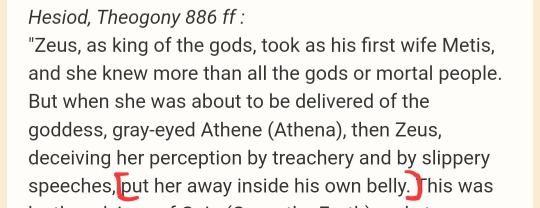
While the Dionysiaca shows quite a morbid description, the Theogony gives us a simple "He put her away inside his own belly". This is of importance
Greeks believed the stomach was the source of thought (but correct me on it if im wrong, im taking my info from the Theoi.Project page) so "To put her away in his belly" could also mean "Put her inside his mind" in a direct way. Remember that there are versions of the myth of Zeus and Metis that don't explain how this happened (like above) it just says it happened. Some versions try to explain it as Metis shapeshifting into either water or a fly so Zeus could swallow her whole in 1 gulp.
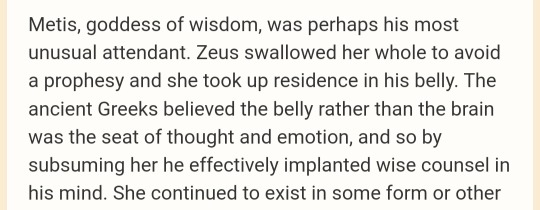
Meanwhile, Cronus description of this act uses a word, "banqueted". Almost as if he enjoyed this merciless act. Even says "Cannibal wise" meaning it had to be horrific, he didn't swallowed whole, he teared tissue, he probably even crunched bones. Ate them as if they were a piece of meat.
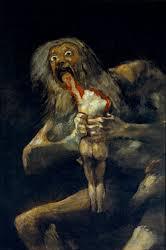
(Saturn(Cronus) Eating his son - Francisco de Goya)
What does this mean? Gentleness
Where Cronus was ruthless, gulping down his sons in a morbid way, Zeus was gentle with Metis.
If it was the same mistake, if they are so similar, why wouldn't Zeus just do the same as Cronus? Eat her whole, crunch at her bones, drink her blood. The outcome would have been the same.
He didn't. He tricked her into becoming smaller, so that she wouldn't suffer. So that it would be quick. Was it out of love for Metis? Was it so Zeus would feel better about himself? Take your pick. But he was gentle with her, swallowing her, putting her inside his mind as carefully as he could.
"He still ate her!! And while pregnant!! That is barbaric!!"
Well, i like to believe it was also so Metis wouldn't suffer like Rhea...
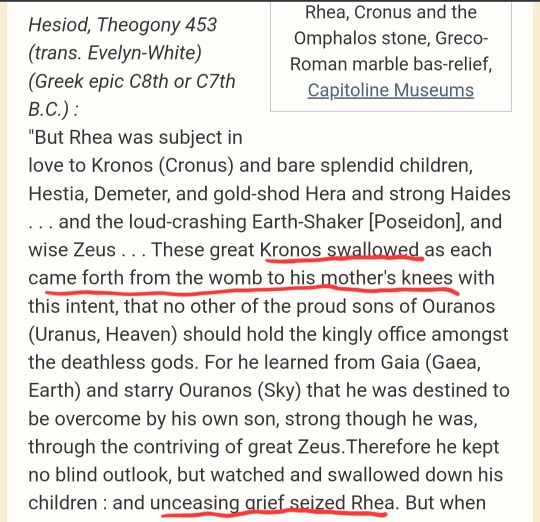
5 times Rhea gave birth, 5 times Cronus swallowed the children before they could even open their eyes.
"Unceasing grief seized Rhea" Zeus knew just how much his mother had suffered at the hands of a man who keept stealing the chance to be a mother from her.
He couldn't do that to Metis. He could have just as easily ate Athena at birth, and keep Metis, even if she would hate him afterwards. Truly repeat history and make of Metis a second Rhea.
He didn't.
So he took a way less barbaric path than Cronus. And they acted with different intentions, with different hearts on it.
Still wrong in his actions, Zeus still did a horrific thing. Yet, in his mind, he wanted to be as gentle as he could be. He didn't want Metis to experience pain, he didn't want an unborn Athena to be born only to die on the spot. The love was there, mixed with the paranoia. But the love was there.
2. Why did Zeus did it?
It is obvious, isn't it? The prophecy.
Metis was going to bare a child meant to overthrown him. He couldn't have that, he wouldn't have yet another conflict. And you'd say that he was such a coward for it
But remember, it is most likely Zeus had just came out of Titanomachy by this. He just spent 10 years of war against his own father. He was not eager to go into another familial conflict so quickly. Heck, he couldn't even know if his son would or would not be a good king at the very least.
He is god of Order. And Order he must mantain, even if it pains him. He would not go to war again, and not against his own blood.
Yet, if it was the boy that worried him, why not just.... Divorce? The prophecy was clear as day, the first child would be a girl, a safe girl. He could have her, then go separate ways with Metis.
He has done this before. He stopped chasing for Thetys when it was prophetizied that she would bear children greater than his parents. He could have done the same with Metis.
Yet he didn't. This man could not just let go of Metis, he couldn't bear the thought of letting her drift away. Wheter it was her smarts, her cunning, and he felt like he needed her to be a good king, or that he just loved her to the point of borderline obssesion; whatever intention he had,
He. Would. Not. Let. Go.
So at this point, its no even about fear of Athena being born. He just can't let this wise, amazing woman to run away from him. Who else is going to help him rule? He NEEDS her. Without her, who is he?
They won Titanomachy, because Metis was there to counsel him. And Zeus trusted that as his wife, Metis would keep on helping him, that they would be an amazing ruling team. Zeus had the charisma of a leader, and Metis was the brains needed to rule a kingdom.
Divorce, sure. And then Metis goes away, and Zeus would never find another woman as wise, cunning, and smart as her to help him rule. Divorce her, and his first love will wither away, leaving nothing but painful memories of what could have been without that pesky prophecy.
And so, in his desperation, he makes this plan.
And he literally has a epiphet born from it:

"Metieta" was an Epiphet used to refer to the wise counsell of Zeus. An important characteristic for a king.
But it also refers to what he did to Metis. Now inmortalized as one of his traits. This was his objective. They truly are now bonded for life, never to be separated.
And in some versions of the myth, Metis doesn't seem to mind. At least not enough to try and escape.
3. The Life of Metis inside Zeus.
Gosh are writers obssesed with the idea that Metis is misserable inside of Zeus' thoughts (And while that's a depressive idea that i love to explore too) there's this one text of Hesiod that makes me wonder if that's the case....
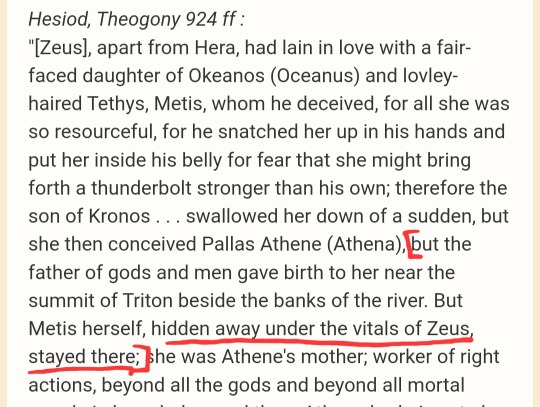
This text gives the implication that Metis had the chance to also run away during Athena's birth. That it was her chance as well to be set free.
But she stayed hidden within Zeus' vitals. She decided to not take the chance. And im starting to think the obssesion is going both ways for this two gods.
Im not saying that Metis is not upset about it, that she wouldn't want to be free. But if she does, its a given that she and Zeus won't be able to stay together. It would be the end of it. She would have to go away, for Zeus wouldn't find another way to keep her.
It's complex for her.
"He did this to me!! But he did out of love... He ate me just like that!! But he did it gently... He did the same as his father!! But did he now? He has placed me among his dreams, he has put me in a high regard, he has build this place for me inside his conciousness because it was the safest bet for us..."
She doesn't know anymore what to feel about this. Its messy, so so messy.
Because most writers explore the idea of Metis suffering in a kind of wasteland that Zeus' thoughts must be, but i don't see anyone thinking of the opposite.
And what if Zeus placed her among his dreams? What if he put her in his imaginations. Crafted a whole, wonderful world inside his mind just for her, so she would be as comfy as possible inside of him. I don't think its impossible, we already stablished Zeus was gentle before, why won't he be now?
Another missconception is that most people think this was the dead of Metis, but yet it wasn't. She's still alive
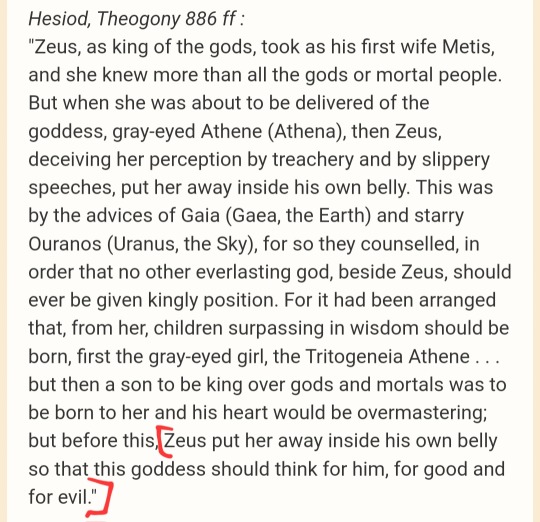
She's in there, and she knows of everything that's happening, and she is still giving Zeus counsel everytime he needs it. She can be bitter about it, yet she still helps him. In a way, you can say that any myth that involves Zeus' taking a choice wether in a jugdement or something, Metis IS THERE.
It even speaks volumes when you take in consideration that there is a version of the Myth where METIS HERSELF gives the prophecy to Zeus. Like, you would think the goddess of wisdom would rather keep that one to herself. She didn't
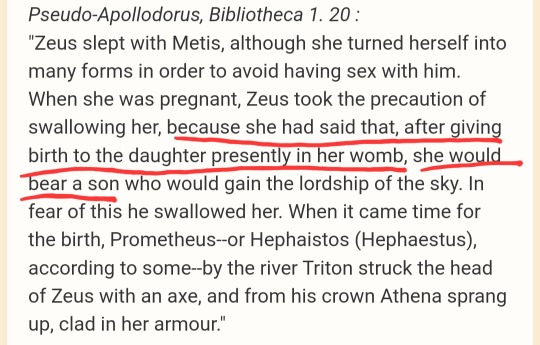
Why? Why would you tell yourself like that, woman? Maybe in a effort to see if you and Zeus can solve this dilemma? Who knows?
Either way, to put it in a silly way, Metis lives rent free in Zeus' brain. And she doesn't seem to have plans of leaving anytime soon (even if it seems she would be capable of). She only forced open Zeus' head so that Athena could be born.
By the way, wasn't Athena one of the "feared child of the prophecy"
If so.... Why the heck is she the favorite?
4. Athena
The feared child, the one that promtped Zeus into eating Metis. Yet she gains the tittle of the favorite daughter?
Let's review. Athena has done a lot of things, some of which would even make you question why is she the favorite daughter.
Her involvemnt in the Troyan war AGAISNT the troyans even thought Troy was one of Zeus' favorite cities. In some versions she is part of the mutiny against Zeus too.
But guess who's the only one that gets away with a slap on the wrist, while Hera gets hanged and Poseidon and Apollo banished to troy?
Who gets to use the lighting bolt? With who does Zeus shares the aegis? For who does Zeus releases Odysseus?
Athena and Zeus relashionship really is; "Daddy, i want a new barbie dream house!" "Anything for my smart-cookie!!"
Why tho? I like to think that it is because Athena is what Zeus' has left of Metis, in a physical way. She is the embodiment of Zeus' first love, the produce of it. And she has her eyes, and she and Metis share the same symbols, and there is so much of Metis in Athena that it sometimes pains Zeus.
Of course, that last bit is headcannon but still, what other reason would there be to love so deeply one of the childs who could bring your ruin?
5. Summary
Cannibalism can be used in many ways as a storytelling device.
Most use them to represent a toxic relationship, abuse, and assault. But it can also be used to represent obssesion, devotion, love and a wish to be one with another.
Don't believe me? If you are familiar with Christianity, you know christians have this one ritual where they eat a piece of bread and wine, meant to represent the body of Christ? That they do it as an act of devotion, and to remember Jesus sacrifice to humanity and yadda yadda.
It bases on the idea that once you digest something, part of it will be forever with you, united for eternity.
There's a clear distinction between Cronus, that cannibalize his sons in a horrific way, not to gain anything from it but the morbid satisfaction of keeping his crown.
And Zeus, who did so gently, and made sure that Metis could still speak to him from within. And when Athena was born, he didn't even got mad about it, but embraced her as his favorite.
I think, this myth and the relashionship between Zeus and Metis has lots of potentials for retellings. It has so many angles you can choose from, after all!
With this, i rest my case. Srry if i scared you with this one tho jsksjs
31 notes
·
View notes
Text
Redacted thoughts
Spoilers if you haven’t listened to the new Hush/Avior/Starlight vid
I’ve been thinking about this one for a while actually, because there was this thought that was bugging me, and I only just straightened it out.
The whole thing has a lot of similarities to the birth of Athena.
I am an avid fan of Greek mythology (as if you couldn’t somehow already tell) and I am wholeheartedly embracing the opportunity to rant.
First of all, while you have the whole Hush-splitting-from-Avior thing, we need to talk about how he got there in the first place. The Sovereigns deemed in necessary and appropriate for the good of the world and the order that has been established. Athena’s mother, Metis, a nymph, was pregnant with Zeus’ child - one that was prophesied be smarter than him, and he feared it would overthrow him and disrupt the order he had established. See it?
Then you have his actual “birth” situation. We know that Avior was in severe pain before Hush split from him, and that none of his fellow daemons could help. In the mythos, Zeus came down with a splitting headache that none of the gods knew how to cure. Hush pulls away from Avior in a final moment of agony and Zeus literally bashed his own head in to relive the pressure (or Hephaestus split his head open with an axe at Zeus’ request, but the premise is still the same).
Hush springs out fully formed, completely furnished with all the tools (the Sovereigns think) he will need. Athena comes out of Zeus’ brain fully formed and wearing a full set of armour.
Athena is a master of strategy and calculating the odds. Hush relies solely on the numbers, calculating which route is the most efficient / aligning with his cause.
She experiences flights of anger and passion despite her stoic nature, such as with Arachne; Hush is now struggling to grasp the depth of his newfound emotions, especially with Doc.
She is a goddess of virginity, staying “pure” and some might even say “innocent” (�� but stay with me). Hush is… inexperienced in the fields of romance and emotion.
She is the goddess of wisdom and war strategy above all. Hush is a weapon, crafted by the Sovereigns, capable of power no one can match.
Athena is loyal to her father, loyal to the other gods. She prevents the collapse of the Age of the Gods this way, averting a major disaster.
Hush is loyal to his creators, loyal to the Sovereigns. Will it be enough though?
I’m well aware Eric probs didn’t think of all this / do it on purpose, but I couldn’t help myself :)
Anyway I love the Redacedverse. 10/10 would recommend.
#redacted audio#redacted asmr#redactedverse#redacted fandom#redacted hush#redacted starlight#redacted avior
32 notes
·
View notes
Note
Two things, first, wouldn't it be a punch in the gut to Poseidon that his daughter, his sweet little girl he's happy to finally have back again and when this all ends she's coming back to Atlantis with him, could not drown in any type of water but died drowning in her best friend's blood?
Second, my theory is that in the first timeline Perse was born the way she seemed, an innocent little goddess who felt like she failed at birth bc the Athenians did not wholy accept her (bc she was both the fountain and the olive leaves). Her life goes as normal, she's a very minor goddess with not many worshipers and since she was born not knowing anything she did not claim demigods as a domain(there were barely any at the time after all), until Zeus smites her bc she did not agree with the deadbeat law and since she's very minor that was enough to make her fade until she's reborn to Sally Jackson
Then she dies again, drowning on the blood of her best friend who's the reincarnation of her daughter and goes back to the past but now with the memories of her time as a demigod but not her time as a goddess
In her best friend’s blood who was her daughter in a past life 😭😭😭 imagine him going after her body and finding them clinging to each other even though they're just corpses now. Athena screamed at him that nothing of it would've happened if he hadn't kept their daughter from her 😭😭😭
Yeah, in the first time I think she was what she seemed to be. But maybe she became the demigod’s goddess because she, herself, claimed herself to be only half of a goddess since her birth was due to rejection. So the things she does in that life, she does because she thinks that the best at the moment. While, later, Percy ends up doing the same thing, thinking she’d get to avoid the original outcome.
And I can definitely see Zeus and her starting to fight more and more as he realises the demigods are dangerous (when he decides that gods must keep distance). Even original Perse thought it was absurd, especially since it would seriously affect her own domains.
74 notes
·
View notes